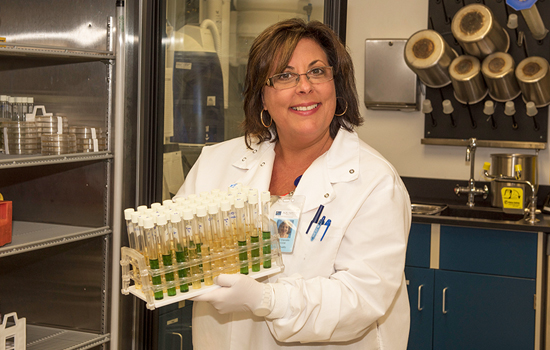Monitoring, Treatment & Distribution
188,109 tests of water
Aquarion performed 188,109 tests of its water in 2024. We do this annually at various locations, continually monitoring water from our reservoirs and wells for more than 100 compounds. We monitor for:
- Microbial contaminants from septic systems, agriculture and livestock operations, and wildlife
- Inorganic contaminants such as salts and metals that can naturally occur or result from urban stormwater runoff, industrial or domestic wastewater discharges, or farming
- Pesticides and herbicides from sources such as agriculture, urban stormwater runoff, and residential uses
- Organic chemical contaminants, including synthetic and volatile organic chemicals, which are by-products of industrial processes
- Radioactive contaminants that can naturally occur
- Lead and other contaminants as required by the EPA.

Treatment
The water derived from Aquarion wells is naturally filtered underground. We filter our reservoir water at treatment plants. First, we add chemicals that make impurities settle. Then, we filter the water through sand. The final stage of treatment includes chlorine for disinfection. Other stages vary but could include fluoride to prevent tooth decay, or sodium hydroxide and a phosphate to minimize pipe corrosion.
Distribution
Aquarion distributes clean water to customers via a vast system of pipes through which the water is pumped or fed by gravity. Periodically, we clean the pipes to remove naturally occurring sediments. By keeping the pipes clean, we are able to maintain the high quality of the water that comes out of your tap.
Source Protection
Aquarion’s commitment to providing the highest quality water is evidenced by the efforts it makes to protect its reservoir and groundwater sources from contamination. Aquarion continually conducts site inspections and monitors land use activities and water quality at hundreds of locations throughout our watershed and aquifer areas.
Strict regulations protect our water supplies by safeguarding the lands that surround our reservoirs and wellfields, and Aquarion is vigilant in monitoring activities on those lands. Enforcement officers from Aquarion, Connecticut Department of Public Health, Massachusetts Department of Environmental Protection, and NH Department of Environmental Services regularly patrol these properties and take immediate and decisive enforcement action when necessary.
Protecting water resources is everyone’s responsibility; however, the public’s awareness and compliance with water protection regulations enable us to keep certain watershed areas open for public recreation and education. For example, all visitors to our properties need a valid permit issued through Aquarion, and certain activities such as camping, dog walking, horseback riding, and the use of motorized vehicles are prohibited.
If you see any activity that could contaminate or otherwise endanger drinking water supplies, call Aquarion or the local police. Learn more about how you can protect drinking water resources.
Frequently Asked Questions (FAQs)
More information
- Connecticut Department of Public Health (CT DPH) Drinking Water Section
- Massachusetts Department of Environmental Protection (MASSDEP) Drinking Water Section
- New Hampshire Department of Environmental Services (NH DES) Drinking Water and Groundwater Bureau
- Environmental Protection Agency (EPA)
- American Water Works Association (AWWA)
- The Water Research Foundation (WRF)
